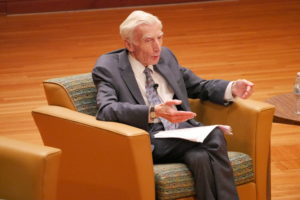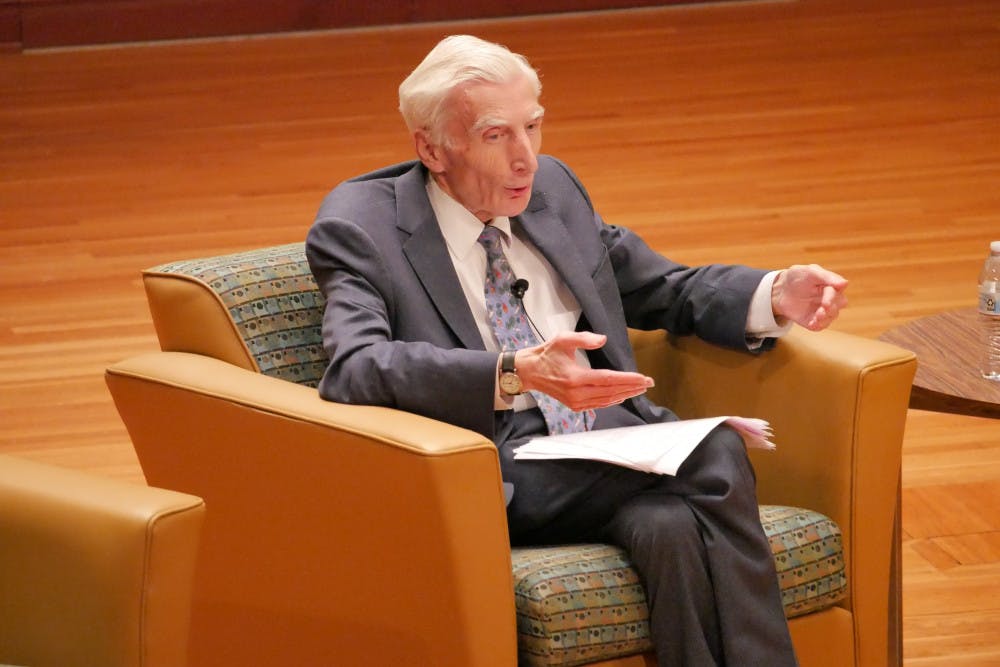By Sumayah Medlin
Staff Writer
The School of Business Center for Innovation and Ethics welcomed Martin Rees, a leading astrophysicist and cosmologist, to present his lecture on the prospects for humanity in the Mayo Concert Hall on April 29 at 6:30 p.m.

Interim Dean of the School of Business and economics professor Bozena Leven welcomed Rees to the stage. While introducing Rees, she emphasized that human nature has remained a constant over time, even since the writing of Greek mythology.
“We are the same species driven by similar needs and emotions,” she said.
Rees is an Astronomer Royal of the United Kingdom and former director of the Institute of Astronomy at Cambridge University. His lecture was based on his book, “On the Future: Prospects for Humanity,” which Princeton University Press described as, “a provocative and inspiring look at the future of humanity and science.”
He described his deep interest in the evolution of science and the technological risks it could have, such as the use of artificial intelligence and the potential to prevent further warming of the earth.
Rees gave three predictions for guests to ponder — first, he said that the world will get more crowded, mostly as a result of excessive reproduction and a lack of habitable land. The next prediction he gave was that extinction rates will continue to rise.
“We’re destroying the book of life before we read it,” Rees said.
The third prediction was that the world will get warmer via climate change. While climate change is an issue that is constantly in the public eye, Rees said that people are not committed to taking action in the issue.
“It’s not under-discussed, but under-acted upon,” Rees said.
He also noted that if no action takes place soon, climate change may become irreversible.
On the topic of climate change, Rees said that he is both a pessimist and an optimist. He argued that climate change could be reversible only if people act upon it, and that no action is the result of political and ethical failures. He insisted that there is too little panic and that science should be more exposed to the public.
“We’re all on this crowded earth together,” he said.
Rees went on to say that climate change is an issue that should be important to all citizens on Earth and not just scientists. According to Rees, the most effective and easiest way to combat change is to find cleaner energy.
“We need to be evangelists for clean energy and technology,” he said.
On the topic of technology — robots and artificial intelligence specifically — Rees said that he is unsure which technology will dominate since it is advancing so fast. However, due to the current rate of technology, he proposed that scientists will understand how life began on Earth in about 20 years.
Rees acknowledged that advancements in technology can be quite scary, as one of the concerns about the emergence of robots is how human-like artificial intelligence will be. However, he said that some inventors like Ray Kurzweil, the principal inventor of the first print-to-speech reading machine for the blind, believes that humans can transcend biology by merging with robots.
He believes that soon, human brains will be able to connect to the internet, similar to Google Cloud, and thinking will be both biological and non-biological, a belief that Rees alluded to by saying technological advancements will supersede Darwinian evolution.
“We should think of ourselves as a transitional stage and not even a halfway stage,” Rees said.
In the faculty portion of the lecture, moderated by professor of law, ethics and innovation Kevin H. Michels, the founding director of the School of Business Center for Innovation and Ethics, interactive multimedia professor Christopher Ault said that it is both intriguing and terrifying that his kids will live in a much more virtual world. However, he is afraid of the appropriation of technology, such as its use to manipulate speeches by politicians.
He has seen videos “where people are completely and convincingly manipulating the words coming out of the mouths of politicians and celebrities making people say something that they never said, something that’s often countered to something that they’d naturally say," he said. "They’re terrifying.”
As for the question of whether technology will replace mankind, professor of marketing and interdisciplinary business Susanna Monseau said that in every industrial evolution, more jobs have been created than lost.
She also noted that humans' abilities will be greater than robots in terms of aspects like curating museums and caring for the elderly. Monseau said it is up to politicians to make the distinction between jobs for robots and jobs for people while continuing to honor advancements in technology.
“There’s always going to be things that humans can do better than machines,” Monseau said.







